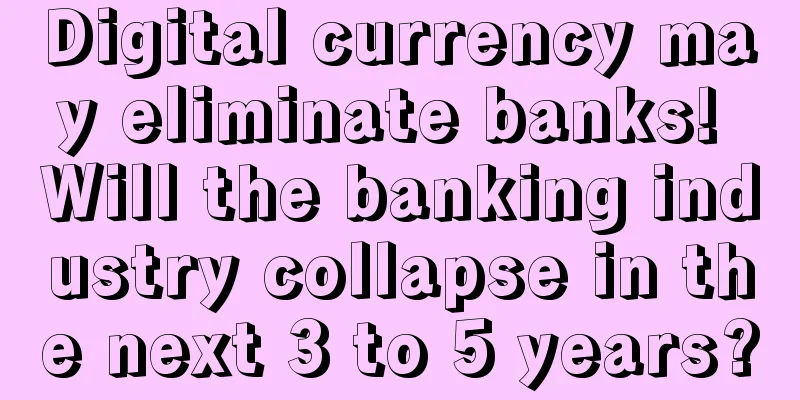Digital currency may eliminate banks! Will the banking industry collapse in the next 3 to 5 years?

|
Russian media recently published an article titled "National Affairs: Digital Currency May Eliminate Banks", saying that Federal Reserve analysts have concluded that central banks' efforts to establish sovereign digital currencies will pose a threat to the entire banking system. Recently, the news that more and more countries are considering establishing digital currencies has sounded the alarm for the world's banking industry. The countries that take the lead in using digital currencies will gain a great advantage because their financial systems are more professional and efficient. Some people say: "In the next 3 to 5 years, the banking industry may collapse..." The banking industry may collapse in the next 3 to 5 years Digital currencies and blockchain technology are likely to cause unparalleled losses to the banking industry, and this has long been said. In 2016, German Gref, head of the Russian Savings Bank, warned: "The banking industry may collapse in the next three to five years." New technology advocates believe that if digital currency replaces the current legal tender, traditional contracts will be replaced by electronic contracts, and credit will skip third-party platforms and be conducted on a peer-to-peer basis. The need for the state or bank to act as an intermediary will disappear. In recent years, the attitudes of many countries towards blockchain and digital currency have changed from rejection to acceptance. Basically every major country has begun to study related technologies, and most of the Fortune 500 companies are also investing huge efforts in the research and development of blockchain technology in order to bring new technology and more efficient operation efficiency. At the same time, some governments and central banks are eager to permanently stop using physical currency, because physical currency requires a lot of manpower and material resources in printing, monitoring and anti-counterfeiting, and will also generate a "shadow economy." (Shadow economy: refers to the economic market where the state cannot implement tax management and monitoring.) Moreover, digital currency can effectively detect tax evasion and will greatly increase the difficulty for criminals to launder money. Digital currency under unified management will undoubtedly be able to do all of this in the future, and this ability is impossible not to be admired. The central bank’s position may change Money is now issued through a two-tier system: 1. Provided by the central bank to banks at a certain interest rate to ensure liquidity. 2. Banks become secondary issuers, injecting money into the economy by granting credit and absorbing part of the funds of residents and various organizations in the form of deposits. If a unified digital currency is issued, the central bank will no longer be just an arbitrator and regulator, but a real player. This is actually nothing new in history. For example, the Bank of England, founded in 1694, is one of the oldest central banks in the world, and its main purpose is to collect profits. It can compete with other banks completely freely, accept deposits and provide loans to commercial institutions on the same terms. The First and Second Banks of the United States and the predecessor of the Federal Reserve also did this. In some other countries, central bank-like institutions also completely dominated the national credit system. For example, in 1900, the Bank of Spain controlled 68% of credit assets and 73% of deposits. In the 20th century, the banking situation began to change. As private bank deposits gradually expanded, the central bank became the lender of last resort, whose task was to maintain financial and macroeconomic stability, and whose only functions were issuance and supervision. Now we may have to go back to the beginning. Digital currency has put forward new requirements for banks. With the emergence of broadband Internet, central banks no longer need to set up many business outlets to deal directly with customers, which fundamentally simplifies business procedures. Potential In the blockchain system, digital currency can be sent directly to the accounts of residents and institutions. In this way, the need to allocate funds through intermediaries disappears. Of course, for banks, there are still time deposits. But the prospects in this regard are not so bright either. Due to inflation, the interest given by banks is actually negative interest to some extent. If there are other options, depositors may not be willing to deposit their money in banks. In addition, the issuance of digital currency has many additional benefits for the central bank. For example, monetary and credit policies will be more effective, especially in the event of a crisis. After the 2008 economic crisis, central banks of various countries injected trillions of funds into their financial systems, but they failed to restore economic growth to pre-crisis levels because a large part of the money went to the securities market, but the assets in the securities market did not receive the proper valuation. During this epidemic crisis, governments around the world have adopted "helicopter money" to stimulate GDP, that is, directly sending money/consumption vouchers to consumers. The most striking example is the US government's decision to give each eligible American adult $1,200. Compared with ordinary money distribution methods, digital currency is actually more suitable for this method of distributing money. Experts pointed out that if the central bank can also receive fiscal deposit subsidies in addition to this, the competitiveness of the banking market will be greatly reduced, and the mediator may become a deposit monopoly. Commercial banks will also inevitably be impacted. Countries that take the lead in using digital currencies will gain greater advantages because their financial systems are more professional and efficient. |
Recommend
What does a long love line mean?
The heart line is one of the three main lines in ...
What are the characteristics of a man who is unlucky in marriage? You must not marry him.
If a man has a bad face, it will have a great imp...
What impact will horizontal lines on the bridge of the nose have on marriage? Is it good or bad to have horizontal lines on the bridge of the nose?
People with horizontal lines on the root of the n...
Moles that bring bad luck and loss of wealth. I hope you don’t have them.
1. Mole on the wing of nose The nose is the palac...
Eyes determine a person's wealth and poverty in life
Eyes determine a person's wealth and poverty ...
Looking beyond appearances to the essence, NFT is not mysterious
Looking beyond appearances to the essence, NFT is...
Bitcoin + Ethereum wallet service platform
Earlier this month,安东尼•迪•伊奥里奥, founder of bitcoin...
Excess electricity generation is always wasted. US power plants simply install mining machines to mine Bitcoin
When the Bitcoin market was hot in the past two y...
How happy is your marriage?
How happy is your marriage? In the traditional Ch...
How to deal with the forehead wrinkles
Physiognomy is a part of physiognomy and it also ...
Is it okay for a woman to have a mole on her forehead?
In ancient times, the forehead was called the Hea...
Tether claims 30 million USDT stolen, Huobi Pro, OKEx and other exchanges suspend deposit and withdrawal services
Tether, the mysterious company behind the digital...
Bitcoin rose more than 10% in a day, and the crypto market sounded the bull market horn
According to Bitpush data, Bitcoin, the cryptocur...
Facebook obtains electronic currency license in Europe, will Bitcoin face new competitors?
Recently, the Central Bank of Ireland granted Fac...
What does a mole above the phoenix eye pattern mean?
The phoenix eye pattern is a type of palmistry, wh...









